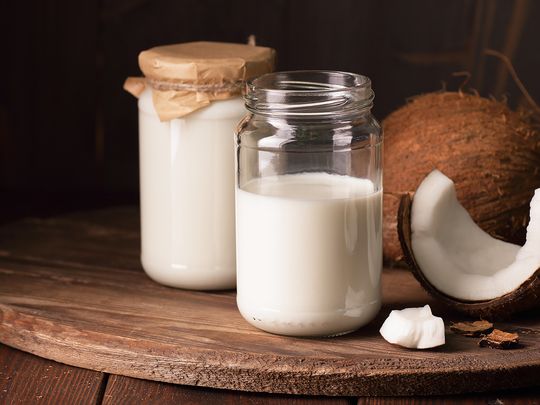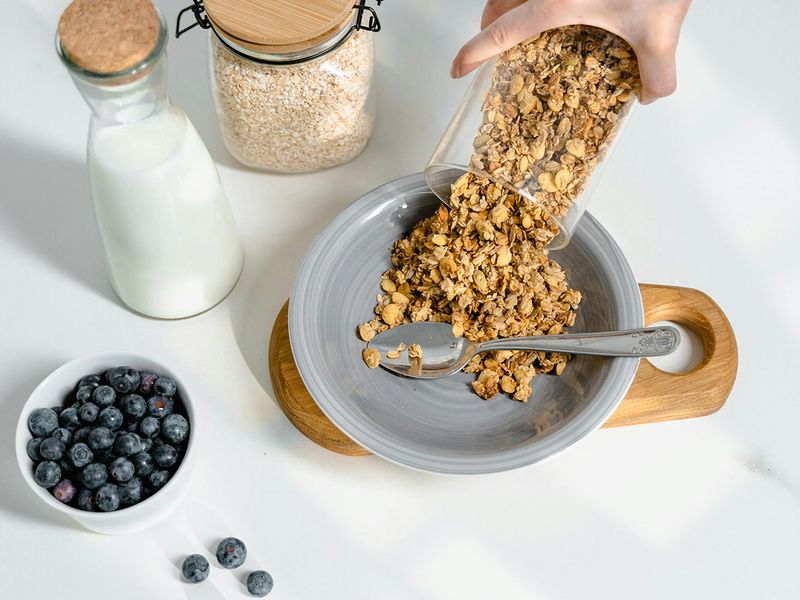
Creamy, decadent, and irresistibly rich, coconut milk is the magic ingredient that transforms every dish into a masterpiece. Chicken curry? Always a winner. A comforting, aromatic egg curry? Absolutely.
Everyone has a favourite way to enjoy it. Take May Lee, a Dubai-based expat and freelancer from Singapore, treasures her coconut shrimp laksa. Plump, juicy shrimp rest atop rice noodles, bathed in a fragrant coconut milk broth spiced with turmeric, ginger, and chili. Topped with fresh cilantro and lime wedges, it’s like a warm, tropical hug for your soul, as she says.

Meanwhile, Neha Das, an Abu Dhabi-based marketing professional, loves adding coconut milk to desserts. Her go-to? A luscious coconut cream pie that’s as indulgent as it sounds.
Yet, coconut milk isn’t just about satisfying cravings; it’s also packed with health benefits that make it a guilt-free addition to your meals. From supporting heart health to aiding digestion, coconut milk nourishes your body too. With its rich nutritional profile, including antioxidants, healthy fats, and immune-boosting properties, coconut milk isn’t just a kitchen essential, it boosts your overall health too.
What is coconut milk, exactly?

As Sushma Ghag, a Dubai-based dietician and Aisha Jain, an Abu Dhabi-based physician explain, coconut milk isn’t actually milk in the traditional sense, it’s a creamy liquid extracted from mature coconuts, part of the palm family (Arecaceae). Unlike dairy milk, it’s entirely plant-based, making it a favourite in tropical cuisines and vegan diets alike.
The coconut itself has a unique nutritional profile. “It’s rich in healthy fats and low in sugar, with its makeup consisting of about 51 per cent kernel, or meat), 10 per cent water, and 39 per cent shell,” explains Jain. “This combination just adds to its power, and an essential crop in tropical regions, especially throughout Asia, where it’s widely cultivated and considered an economic plant.”
So, what exactly is coconut milk? Jain elaborates, “Technically, it’s an oil-in-water emulsion stabilised by proteins naturally found in the coconut. Manufacturers often add stabilisers to ensure the milk’s smooth texture and extended shelf life. Coconut cream, the full-fat version, is extracted directly from the thick white meat of mature coconuts. For a silkier consistency, coconut cream can be blended with coconut water to create what we recognise as coconut milk.”
For those who are watching their calorie intake, lighter versions of coconut milk are available. “These are made by straining out some of the natural fats, resulting in a thinner, lower-calorie alternative. However, full-fat coconut milk retains all its natural fatty acids, making it ideal for creamy curries, soups, and desserts,” she adds.
The nutritional power of coconut milk
As the specialists explain, coconut milk is filled with essential minerals like potassium, magnesium, manganese, and selenium. Its fats, primarily medium-chain triglycerides (MCTs), stand out for their unique ability to be quickly converted into energy or ketones, supporting metabolism and potentially aiding weight management, explains Jain. Unlike traditional saturated fats, MCTs are less likely to be stored as body fat.
Here's a rundown of its nutrients, explains Jain.
Moderate protein content
With about 5 grams per cup, coconut milk adds a small but valuable amount of plant-based protein to your diet.
Low in carbohydrates
Coconut milk is naturally low in carbs, making it a popular choice for ketogenic and low-carb diets.
Rich in minerals
It’s a good source of magnesium, iron, and potassium, essential for maintaining strong bones, healthy blood, and balanced electrolytes.
Naturally dairy-free
Free of lactose and cholesterol, coconut milk is a commendable option for those with dairy intolerances or those following vegan diets.
Furthermore, it contains small amounts of vitamin E, vitamin K, thiamine, B6, pantothenic acid, choline, and calcium, which adds a flavour to any dish. “Beyond these vitamins, it also has lauric acid, a medium-chain fatty acid that the body absorbs easily and converts into energy,” explains Jain. “As full-fat coconut milk is calorie-dense, it's best to enjoy it in moderation, about 1/4 to 1/2 cup at a time. Whether you're using it in recipes like coconut whipped cream or blending it into a smoothie, it can be a healthy addition to your meals, without overloading your calorie intake.”
How does coconut milk benefit our health?
Beyond its flavour and texture, coconut milk packs a punch when it comes to health benefits. Ghag explains, coconut milk is abundant in antioxidants, which play a crucial role in protecting the body from free radical damage. Free radicals are unstable molecules that can wreak havoc on cells, tissues, and organs, contributing to the development of a wide range of diseases, including cancer, cardiovascular disorders, Alzheimer’s disease, and age-related dementia. These harmful molecules are produced through normal bodily processes, however, factors like pollution, stress, and poor diet can increase their presence.

Coconut milk is rich in antioxidants, which prevent free radical damage, free radicals are associated with the development of many diseases including cancer, cardiovascular disorders, Alzheimer’s disease and age-related dementia...
“The antioxidants help neutralise these free radicals, reducing the risk of chronic illnesses and slowing down the aging process. In fact, antioxidants are not only preventive, they can also help repair previous cellular damage, promoting overall health and longevity,” she adds.
Heart health
Coconut milk, which has lauric acid, has the potential to support heart health by influencing cholesterol levels in a beneficial way. "Lauric acid can increase HDL (good) cholesterol without significantly raising LDL (bad) cholesterol, which may help lower the risk of cardiovascular diseases," explains Jain. Studies, including a 2020 research piece published in the American Journal of Clinical Nutrition, suggest that lauric acid can improve cholesterol ratios, promoting better heart health. Additionally, research published in US-based scientific journal Lipids in Health and Disease highlights that coconut products, such as coconut milk, may have a neutral or even positive impact on lipid profiles when consumed in moderation as part of a balanced diet.
However, experts advise moderation due to the high calorie and fat content of coconut milk. By controlling portions, you can maximize its cardiovascular benefits while maintaining a balanced diet and overall health.
Is coconut milk good for weight loss?

Due to the presence of MCTs, coconut milk, if used in moderation, can be an ally in weight loss. According to a 2021 study by McGill University's School of Dietetics and Human Nutrition, diets high in MCTs have been shown to result in greater fat loss compared to diets with long-chain fatty acids (LCFAs), which are commonly found in a variety of foods, such as meats, dairy products, and certain plant oils, including olive oil and canola oil.
These fatty acids are the most abundant type of fat in the human diet and are metabolized more slowly than MCTs, which are rapidly absorbed and converted into energy. This quick conversion increases energy expenditure, calorie burn, and fat oxidation, the process of breaking down fat for energy, As a result, MCTs are more effective in promoting fat loss than longer-chain fatty acids, which require more effort for digestion.
As a food high in MCTs, coconut milk can be a filling and fat-burning addition to your diet. Healthy fats, like those found in coconut milk, provide a sense of satiety, helping you avoid overeating and cravings that can lead to weight gain.
Reducing inflammation
Cool down inflammation with a splash of coconut milk!
Due to the MCTs and antioxidants, coconut milk is a powerful ally in reducing inflammation. A 2018 study published in the US-based International Journal of Food Science highlights how coconut milk’s phenolic compounds act as antioxidants, helping to combat oxidative stress and alleviate inflammation. Additionally, the lauric acid in coconut milk has been linked to soothing inflammatory responses and supporting immune function.
Gut health
Coconut milk’s MCTs offer a range of benefits for gut health. When consumed, these fats are absorbed directly by the liver, providing a quick source of energy while supporting digestion.
As Ghag explains, coconut milk is an excellent lactose-free alternative for those with dairy allergies. Its lauric acid content, which boasts antimicrobial properties, may help inhibit the growth of harmful bacteria, viruses, and fungi, contributing to a healthier gut microbiome.
Lauric acid is also beneficial for reducing gut inflammation by soothing the immune response in the intestinal lining, which can be especially helpful for individuals suffering from conditions like irritable bowel syndrome (IBS) or ulcerative colitis. Beyond this, coconut milk’s hydrating properties support the liver and kidney, vital organs involved in detoxification, helping to metabolize fats and eliminate waste. This contributes to smoother digestion and a balanced gut.
cramping, diarrhea.
Remember to consume in moderation
Coconut milk might be overflowing with health benefits, including supporting health, digestion and providing essential nutrients, remember that it should be consumed in moderation, warn the experts. Coconut milk, particularly the full-fat version, is calorie-dense and high in saturated fats, which, though beneficial in moderation, can contribute to weight gain and other health issues if consumed excessively.
The specialists recommend controlling portions, especially when incorporating coconut milk into a daily diet, to avoid excessive calorie intake. “For example, limiting serving sizes to about 1/4 to 1/2 cup at a time can allow you to enjoy its rich flavour and health benefits without overloading on fat or calories. Additionally, if you are on a weight management or heart-healthy plan, it's best to balance coconut milk consumption with other nutrient-dense foods and maintain overall dietary moderation,” says Boissard.












